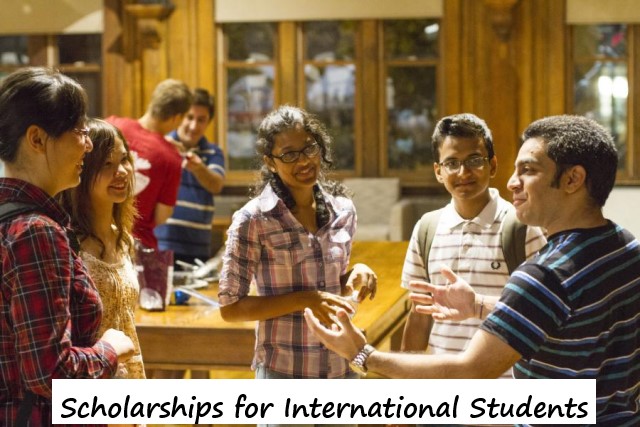Fully Funded Scholarships for International Students, 2023-2024
Numerous scholarships are offered to international students to study abroad. However, not all scholarships provide coverage for all expenses, and some scholarship winners still have a hard time funding their studies. In this post, you will find a compilation of the 2023-2024 fully funded scholarships for international students that are open for application. These scholarships provide necessary funding for your studies. Scholarships on this page may cover all or most of the following items: tuition fee, monthly stipend, Health insurance, flight ticket, research allowance, conference attendance fees, etc.
This list of fully-funded scholarships for international students are open for studies in a wide range of domains (from arts and humanities to science and engineering) to foreign students and students from developing countries. You can study or conduct research at undergraduate, master’s, doctoral and Postdoctoral degree levels or receive short-term training. Most of these fully funded scholarships are provided by governments while the rest are from universities, organizations, and institutions. These scholarships will allow you to travel and study in different countries in the world. You will experience different cultures, discover new things, make life-long friends, and become a resourceful person.
To apply for any of these scholarships, please click on its name. You will be redirected to a page that contains detailed information on eligibility criteria, benefits, and application procedures. Make sure you meet the eligibility criteria and follow the instructions given to submit your application before the deadline. While the application process for most of the fully funded scholarships does not require you to pay any fee, you may be asked to pay application fees for some. Just make sure that you’re sending your money to the scholarship provider if there is an application fee.

Note: Never pay anyone who pretends to work for greatyop, great youth opportunity, or whatsoever name that relates to greatyop.com for application processing, admission letter, or any service.
1. Government of Romania MEAT Scholarship
The scholarship program is organized by the Ministry of Economy, Entrepreneurship and Tourism (MEAT) and the Ministry of Education (ME) for international students willing to study at undergraduate, Master’s and PhD Level in Romania. Each year, about 40 scholarships are granted to eligible foreign citizens to study in Romania. Applicants from all countries in the world, except for EU member states, are welcome to apply for this fully funded scholarship. For Romanian non-speakers who need to study the Romanian Language, a one-year Romanian language preparatory course is granted prior to the actual university studies.
- Level of Study: Undergraduate, Masters, PhD, Research.
- Deadline: .
2. Italian Government Scholarship for Foreign and Italian Citizens
The program is fully funded by the Ministry of Foreign Affairs and International Cooperation and offered to foreign citizens and Italian citizens living abroad. This scholarship program aims to foster international cooperation in cultural, scientific, and technological fields, to promote Italian language and culture to support in Italy’s economic system in the world. The scholarship provides tuition fees, Health and medical/accident insurance, monthly allowance, etc.
- Level of Study: Masters, PhD, Research.
- Deadline: .
3. Kazakhstan Government Scholarship for International Students
The scholarship is offered through the Ministry of Education and Science of the Republic of Kazakhstan to foreign applicants, including persons of Kazakh nationality who are not citizens of the Republic of Kazakhstan. The scholarship is awarded for full-time studies at higher educational institutions in Kazakhstan. It provides full-tuition fees and a monthly allowance. Another great opportunity on this list of fully-funded scholarships for international students to study in Asia.
- Level of Study: Undergraduate, Masters, PhD.
- Deadline: .
4. Scuola Normale Superiore PhD Scholarships
Various PhD positions to study at the Scuola Normale Superiore (SNS) have been announced for the 2023-2024 academic year. Positions are opened to both Italians and foreign students in the fields of Astrochemistry, Italian Studies and Modern Philology, Data Science, Computational Methods and Mathematical Models for Sciences and Finance, History, History of Art. The scholarship a monthly stipend, lodging allowance, research contracts for specific topics, round-trip airfare, and other benefits.
- Level of Study: PhD, Research.
- Deadline: .
5. Canadian Government Banting Fellowships
The Fellowship provides funding to the very best postdoctoral applicants, both nationally and internationally, who will positively contribute to the country’s economic, social, and research-based growth. The scholarship provides $70,000 (taxable) per year. The objective of the Banting Postdoctoral Fellowships program is to attract and retain top-tier postdoctoral talent, both nationally and internationally, develop their leadership potential, position them for success as recherche leaders of tomorrow.
- Level of Study: Postdoctoral, Research.
- Deadline: .
6. Japanese Government MEXT Scholarships
The Ministry of Education, Culture, Sports, Science and Technology (MEXT) of Japan offers scholarships to international students who wish to study in graduate courses at Japanese universities as research Students (either regular students or non-regular students) under the Japanese Government (MEXT) Scholarships. This scholarship is a fully sponsored program that provides all necessary funds for the duration of the applicant’s program.
- Level of Study: Masters, PhD, Research.
- Deadline: .
7. Thailand Government Scholarship for International Students
Fully funded, the Thailand International Postgraduate Program (TIPP) is available for foreign students willing to pursue a Master’s degree program at participating institutions in Thailand. The scholarship Provides Living Allowance, Accommodation allowance, A settlement allowance, Books allowance, Thesis allowance, Tuition fee, Medical Insurance, flight ticket, Domestic travel in Thailand.
- Level of Study: Masters, Research.
- Deadline: .
8. World Bank Scholarship Program
The Joint Japan/World Bank Graduate Scholarship Program is open for citizens of developing countries with relevant professional experience and a history of supporting their countries’ development efforts who are applying for a Master’s degree program in a development-related topic. JJWBGSP offers scholarships for 26 Participating Programs at universities in U.S., Europe, Africa, Oceania and Japan in key areas of development, including economic policy management, tax policy, and infrastructure management.
- Level of Study: Masters.
- Deadline: .
9. Schwarzman Scholars program at Tsinghua University
The Schwarzman Scholarship is available for a rigorous and innovative Master of Global Affairs degree program at Tsinghua University. Drawing on the best traditions of Tsinghua and top academic institutions around the world, the curriculum bridges the academic and professional worlds to educate students about leadership and about China’s expanding role in the world. The scholarship provides tuition Fees, room and board, airfare, required course books, and supplies, a Lenovo laptop, health insurance, a stipend for personal expenses, etc. A fully-funded scholarships for international students to study in China.
- Level of Study: Masters.
- Deadline: .
10. French Institutes for Advanced Study Fellowship
The program offers 10-month fellowships in the six Institutes of Aix-Marseille, Loire Valley, Lyon, Montpellier, Nantes, and Paris. It welcomes applications from high-level international scholars and scientists, primarily in the fields of the social sciences and the humanities (SSH). FIAS awards fellowships to outstanding researchers of all career levels, from Postdoctoral researchers to senior scientists. The program provides a living allowance, two flexible contractual options, social security coverage, accommodation, individual research and training budget, travel expenses, skills training opportunities, etc.
- Level of Study: Postdoctoral, Research.
- Deadline: .
11. Chinese Government’s MOFCOM Scholarship
Created by the Ministry of Commerce (MOFCOM) of the People’s Republic of China, the program aims to sponsor young and middle-aged talents from recipient countries to pursue their postgraduate degree education in China. MOFCOM scholarships are fully funded and provide the necessary funding to selected students during their study period. The program is available for candidates to pursue a Master’s degree or PhD degree at one of the partner institutions in China.
- Level of Study: Masters, PhD, Research.
- Deadline: .
12. Indian Government ICCR and MEA Scholarships
The program regroups different types of scholarships for Foreign Students to study at undergraduate and postgraduate levels as well as conducting research in India. The program is intended for citizens of specific countries interested in studying at Indian universities and higher education institutes. Candidates can study a Bachelor’s, Master’s or PhD degree programs in available fields at higher educational institutions in India. Those who wish to apply for Indian culture should click on the ICCR Scholarship for Indian Culture.
- Level of Study: Undergraduate, Masters, PhD, Postdoctoral, Research.
- Deadline: .
13. Matsumae MIF Research Fellowship in Japan for All
Upon the concept of the founder of the Matsumae International Foundation (MIF), “Towards A Greater Understanding of Japan and a Lasting World Peace”, MIF has started the research Fellowship Program in 1980. The Matsumae MIF Research Fellowship Program is open for applicants from all parts of the world for research stay (3 to 6 months) in Japan. The fellowship grant is restricted to the period indicated in a grant letter.
- Level of Study: Research.
- Deadline: .
14. MasterCard Foundation Scholarship at KNUST
Fully funded, this scholarship program has been created by the Mastercard Foundation in partnership with the Kwame Nkrumah University of Science and Technology. The program wants to raise the next generation of ethical and transformative leaders who would influence positive forward-looking changes in their respective home countries, specifically, and on the African Continent as a whole. This scholarship provides full tuition, monthly stipend, accommodation, learning materials, transportation, counseling support, career development services, etc.
- Level of Study: Undergraduate.
- Deadline: .
15. Government of Mauritius Africa Scholarship
The Mauritius scholarship is awarded to deserving students who are resident citizens of member states of the African Union or of African Commonwealth countries. Winners of the scholarship are given a chance to study Undergraduate, Master’s, and PhD degree programs at Mauritius higher educational institutions.
- Level of Study: Undergraduate, Masters, PhD.
- Deadline: .
16. Hubert H. Humphrey Fellowship Program to the USA
The Hubert H Humphrey Fellowship Program is for experienced professionals interested in strengthening their leadership skills through a mutual exchange of knowledge and understanding about issues of common concern in the United States and the Fellows’ home countries. The program is fully funded and provides ten months of non-degree academic study and related professional experiences in the United States.
- Level: Training.
- Deadline: .
17. IUCEA-World Bank Master Scholarship for Females
The program has been created by the World Bank in partnership with some Governments in Africa to implement the additional financing of the Eastern and Southern Africa Higher Education Centers of Excellence Project. The program aims to encourage young African female students at the postgraduate level by providing a fully funded scholarship to study at master’s degree. Eligible female applicants who can demonstrate interest to undertake postgraduate training in agriculture and related sciences are encouraged to apply.
- Level of Study: Masters, Research.
- Deadline: .
18. UN Fellowship for People of African Descent
This UN Fellowship program aims to strengthen participants’ skills to contribute to the protection and promotion of civil, political, economic, social and cultural rights of people of African descent in their respective countries. This UN fellowship is a three-week intensive learning opportunity for people of African descent from the diaspora, who are engaged in promoting the rights of people of African descent.
- Level of Study: Short Course.
- Deadline: .
19. University of Science and Technology Scholarship for All
Korean students, as well as international students from all over the world, are welcome to apply for Masters and PhD degree programs at the university. All admitted students are awarded the University of Science and Technology Scholarship. The UST scholarship is fully funded and aims to let ensure all students focus on their studies and research. A fully-funded scholarships for international students to study in South Korea.
- Level of Study: Masters, PhD, Research.
- Deadline: .
20. German Chancellor Fellowship for Tomorrow’s Leaders
The Alexander Von Humboldt Foundation’s German Chancellor Fellowship for Tomorrow’s Leaders is targeted at university graduates from South Africa, the United States of America, the Russian Federation, the People’s Republic of China, Brazil and India who have an international outlook and initial leadership experience. It addresses prospective decision-makers, multipliers, and thought leaders from a broad range of professional fields such as politics, public administration and business as well as society and culture.
- Level of Study: Research.
- Deadline: .
21. Skoltech Scholarship in Russia for Local and International Students
The scholarship aims to support international students willing to study a Master’s or PhD degree at the Skolkovo Institute of Science and Technology (Skoltech) in Russia. The scholarship is fully funded and provides coverage for tuition fees, medical insurance, stipend (40,000 rubles for Master’s students and up to 70,000 rubles for graduate students), and any further funding that will be decided on a case-by-case basis by the admission committee. This is a unique opportunity among these Europe scholarships to study in Russia.
- Level of Study: Masters, PhD, Research.
- Deadline: .
22. Fulbright Foreign Student Scholarship to the USA
The Fulbright Foreign Student Scholarship Program enables graduate students, young professionals, and artists from abroad to study and conduct research in the United States of America (USA). This scholarship program operates in more than 155 Fulbright countries and allows selected applicants to study in a variety of programs at partner institutions in the United States of America. This America scholarship is a fully funded program.
- Level of Study: Masters, PhD, Research.
- Deadline: .
23. MISF Du Pré Grants for Multiple Sclerosis Researchers
The 2023 MISF Du Pré Grants for Multiple Sclerosis Researchers is now open for application. The MSIF Du Pré Grant enables MS researchers and clinicians from low- and middle-income countries to make short visits to established Multiple Sclerosis research centres, outside their own country. The program aims to provide care for people with Multiple Sclerosis and supports collaborative research. Following the award, applicants are expected to use the newly developed expertise and networks, and continue MS research and/or clinical practice in low- and middle-income countries.
- Level of Study: Research.
- Deadline: .
24. University of Melbourne Scholarships for All
The University of Melbourne Scholarships are open for Australian and International students to pursue undergraduate or postgraduate research degree programs. Approximately 1600 scholarships will be awarded in all subject areas to eligible students. About 1000 scholarships will be awarded to undergraduates students and around 600 to graduate students. The Graduate Research Scholarships program is a fully funded program that will provide 100% fee remission and up to $110,000. The Melbourne International Undergraduate Scholarship program award up to 100 percent fee remission.
- Level of Study: Undergraduate, Masters, PhD, Research.
- Deadline: .
25. Bézout Labex Masters Scholarships to Study in France
Thanks to the Bézout Labex and the SFRI Program GP-DS, the university is able to fund up to 10 scholarships. These scholarships are offered to outstanding Master’s degree students who wish to study at the University Paris-Est in an integrated program that combines mathematics and computer science: the “Bézout excellence program”. Courses are taught in either in English or in French. This is the last program of fully-funded scholarships for international students.
- Level of Study: Masters, Research.
- Deadline: .
We hope this compilation of Fully Funded scholarships for International Students will help our users in their search for fully sponsored scholarships that are currently open for application. To be the first to see latest opportunities, please follow us on this website https://chubbyparade.com/








